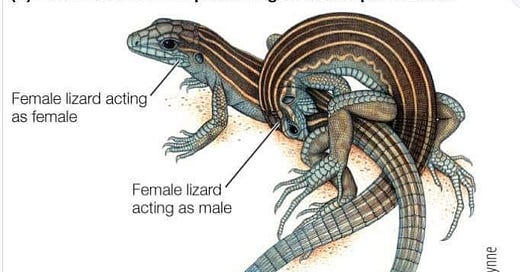I recently put down Countess by Susan Palumbo halfway through, when it occurred to me that it was never even going to be close in the running for best lesbian anti-colonial fantasy novel I’ve ever read. (That prize goes to The Traitor Baru Cormorant by Seth Dickinson, with Santa Olivia by Jacqueline Carey and The Space Between Worlds by Micaiah Johnson easily making the shortlist too)
Speaking of lesbians (sure, why not), the New Mexico whiptail is a female-only species of lizard (and the official state reptile of New Mexico)!
Wikipedia has a list of taxa that use parthenogenesis, of course, which led me to the fascinating discovery that fatherless mice live longer - “the bi-maternal genotype clearly shifted the entire survival curve to the right, suggesting a delay in the expression of all causes of mortality.”
(And now I’m getting the strong urge to go reread The Stars Are Legion by Kameron Hurley, even though it had a bit of the anagram-of-a-good-story1 problem for me the first time around2)
Speaking of Baru (sure, why not), Seth Dickinson doesn’t understand what his own books are about.
I was absolutely obsessed with The Traitor Baru Cormorant, which was all about colonialism and inevitable complicity while trying to fight a system from the inside. It’s about how joining a sick system sickens even people who initially enter with the best of intentions (see also the whole bad apple thing &c). But then the sequels turned into this whole other sort of complicated politics thing instead? He’s clearly confused.
More recently, I also loved Dickinson’s Exordia3, but as it went on I started to get a bit suspicious that the author was confused about this one too, and that any sequels that may appear would probably be a mistake.
My tentative plan going forward is to read the first book of any series Dickinson starts, and leave it at that.4
Have I just become a lazy reader? Maybe. I loved Gideon the Ninth mostly for the incredible narrator’s voice, but didn’t have any patience for the rest of The Locked Tomb trilogy.
I still wish someone would publish a translation of Too Like The Lightning by Ada Palmer from English to English, like those handholding little Shakespeare editions we used to get assigned in elementary school. I get the impression that it’s full of interesting ideas that I’d really enjoy, but I find the language an impenetrable slog.5
Speaking of sick systems (sure, why not) - do you lack a buzz in life? You may be a stressed bee!
And apropos of nothing, really - Search For List Birds (via) has been collecting a list of lost birds, where “a lost species is one not confirmed alive by photographic, audio or genetic information for over 10 years in the wild and has no ex situ population under human care.”
I’m counting this as a happy because they’ve ended up with this wonderful stream of news about lost birds that have been recently rediscovered - eg a New Britain Goshawk was recently photographed for the first time in 55 years!
Y’know, when a story is all full of elements you love, but for some reason they’re put together wrong and it just doesn’t work for you after all. (my earliest memory of thinking of media this way was the movie Pi, which has math and insects and kabbalah and Go and it just blew my mind that I didn’t like it anyway. tbf I watched it as a teenager)
Scifi with really upsetting body horror, problematic disaster queers, grotesque juicy fleshy biotech - how could I not love it?! And yet. (I kinda wonder if a bit of tighter editing might’ve made all the difference for me here. Or just hitting it at a different moment in my life.)
Well, about 90% of it. Occasionally it forgets to be brilliant and darkly hilarious and philosophical and just gets kinda generic scifi instead. But the good bits are by far the majority and they’re just SO GOOD
Even as I write this, I’m tempted to go back and take a second crack at reading the Baru Cormorant sequels. They feel like something I should like - there’s so much economics in there, too! But I bounced off the later books so hard, it was really frustrating.
Palmer, not Shakespeare. Such a bummer, since I strongly suspect that if it weren’t for the language issue I’d find Palmer’s ideas more interesting than Shakespeare’s






Word, on the Ada Palmer books. I don't know if you enjoy audiobooks, but I found the way to get through Too Like the Lightning was to listen to the audiobook; the narrator is sublime and really helps with that translation aspect.